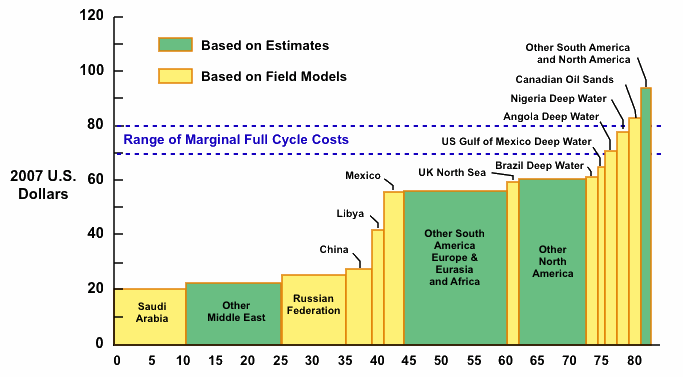Hi again, Dayuhan
Thanks very much for your detailed response.
I should pause at this point and thank you and the others for your interest in this topic…. This sort of discussion is exactly what I had hoped for, and everything that has been said so far (including the occasional bit of disagreement) has been constructive, sensible and respectful.
On to your various points:
1. I agree with your point that high prices still may not lead to investment in volatile regions. Given the volumes of accessible oil in the Middle East, your point makes this issue all the more timely… should Saudi Arabia (for example) become destabilized (or simply suffer a successful attack on Abqaiq and/or Ras Tanura), the global oil export system and the investment climate could be seriously and rapidly affected.
2. As for apocalyptic views of peak oil, I have tried to steer clear of the doomer/survivalist perspective and have repeatedly asked the mainstream media to do the same (since they seem to have difficulty simply explaining the data and the concerns without raising the apocalyptic aspect, which is not helpful).
I have dealt primarily with Energy Bulletin rather than The Oil Drum, but more for reasons of format.
I’m not sure what you are referring to at TOD specifically…
I am usually very pleased with the level of scholarship (ie. sourcing material and providing balanced conclusions) that I’ve seen so far.
As for June 08 being the peak, we’ll have to see.
Matt Simmons, whose work I greatly respect, still argues that production of crude oil (excluding NGL and refinery gains) peaked in 2005 at just over 74 mbpd.
3. On your point about the rear-view mirror (how will we know if it’s the real peak or another false alarm?), I think that Bob Hirsch has it right: he suggests that we view the peak more as a plateau and allow for up & down wiggles.
He suggests a range of 4% up and down, and that people not get worked up one way or the other by variations which occur within that range.
I think that’s good advice.
The flip side of that is that we have been within that 4% range for several years now, so Simmons may eventually be proven correct.
4. As for your final point about the US having a plan for fuel rationing buried away somewhere, you may be right, but if so, then that is probably bad news.
As the recent UK and Australian research stresses, government authorities at any level can only do what they are authorized to do.
If they are prudent, they will not only do their legislative pre-planning well in advance of an actual emergency, but they will also communicate this to the public.
In the case of the UK, the details of their Fuel Emergency plan are secret (presumably because it identifies Essential Users, which is bound to contested by those who feel that they should have been added to the list).
But the fact that their national legislation has been completely reworked and that authority to act has now been assigned to local government authorities has been highly promoted, presumably because they want the UK public to be well aware of these changes and to reduce the likelihood of legal challenges to this change in legislative authority.
If US authorities think that they can suddenly restrict citizens’ access to fuel without being challenged in the courts (and thus risk disempowering authorities just when they need to take effective action to prevent panic buying and hoarding), then they should think again.
That is exactly the scenario that planners in the UK and Australia have worked so hard to prevent, and it does require legislative changes and ongoing communication with the public and with lower-level authorities, little of which seems to be occurring in North America.
Thanks again for your insights on this topic... they are well-founded.





 Reply With Quote
Reply With Quote


 Stuff didn't come from dead Dinosaurs at all. Link to article by F. William Engdahl
Stuff didn't come from dead Dinosaurs at all. Link to article by F. William Engdahl

Bookmarks